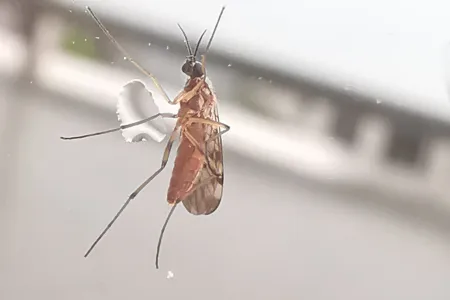News
CDU investigating the biosecurity threat of disease carrying midges
Researchers at Charles Darwin University (CDU) will soon be on the frontline of protecting Northern Australia against potentially severe animal blood borne diseases with a new project looking into the biting midges, an insect of concern for its potential to carry disease that could damage the Australian livestock industry.
Researchers at CDU’s Research Institute for Northern Agriculture (RINA) will work with the Northern Territory’s Department of Industry, Tourism and Trade to study biting midges, or Culicoides, and their ability to carry potentially serious or severe disease that can affect Australian livestock.
RINA’s Professor of Tropical Biosecurity, Maxine Piggott said exotic diseases resulting from an infection transmitted to animals by blood feeding insects such as midges and mosquitoes are on the rise in Australia’s northern neighbouring countries increasing the biosecurity risks to Northern Australia.
“Exotic vector borne diseases are becoming more prevalent in our neighbouring countries and due to this Australia needs to have effective surveillance for early detection,” Professor Piggott said.
“Currently, there is a lack of knowledge on the natural pathways of insect vectors in disease spread in Northern Australia which will impact on preparedness and decision making should any of these exotic diseases cross Australian shores.”
Researchers will collect biting midges samples from multiple locations in Northern Australia and will then use cutting edge genomics approaches to learn more about the biting midges and the potential effect they could have on Australian livestock if an incursion were to occur.
“Dietary analysis of blood meal from the biting midges will be assessed to determine animals hosts as well as analysis of population genomic data using bioinformatics to assess gene flow and natural movement pathways in biting midges,” Professor Piggott said.
“All of this information will help us to build real world data for modelling disease spread and guide surveillance techniques and decision making to provide protection for the livestock industry here in Northern Australia.”
It is hoped that this project could lead to more research being conducted on other insect vectors to further enhance Australia’s animal biosecurity.
“We hope that by working with the Northern Territory Government on this project we can help them effectively plan for the future and we would like to expand this research to build an insect vector database to support biosecurity preparedness across primary industries” Professor Piggott said.
This project has received funding as part of the National Industry PhD Program an initiative of the Federal Government to help solve key industry problems in a range of areas.
RINA, which aims to push agricultural innovation in Northern Australia, is funded by the Commonwealth Government and is supported by project partners including the Department of Tourism, Industry and Trade (DITT), NT Farmers, NT Cattleman’s Association, NT Seafood Council, Murdoch University, James Cook University and Central Queensland University (CQU).
Related Articles

Nanoplastics hindering cognitive abilities of fish, international research shows
Nanoplastic exposure can impair the cognitive abilities of fish and could lead to significant impacts on marine species’ ability to survive, according to a new international study.
Read more about Nanoplastics hindering cognitive abilities of fish, international research shows
Eradication would cost billions: NT’s lessons for Pilbara’s cane toad management
Cane toads are predicted to invade Western Australia’s Pilbara region by 2041 if left unchecked, but the Northern Territory’s population of the pests hold key lessons that could save billions in eradication costs.
Read more about Eradication would cost billions: NT’s lessons for Pilbara’s cane toad management
New project to grow Indigenous aquaculture on one of Australia’s largest islands
An Australian island’s efforts to improve food security and transition into a blue economy will be bolstered by a new project to propagate a nutritious and increasingly popular fish.
Read more about New project to grow Indigenous aquaculture on one of Australia’s largest islands
